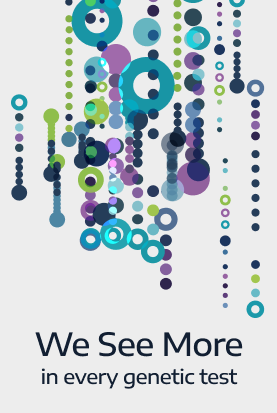
MISSED BY OTHERS, DETECTED BY US
IriSight® Case Study
Clinical presentation
A multigravida with a prior suspected TAR syndrome pregnancy underwent an anatomy scan at 20 weeks gestation. The following findings were indicative of skeletal dysplasia:
- Short long bone, bent long bone, bent femur
- Aplasia/hypoplasia involving forearm bones
- Intrauterine growth retardation
- Small stomach
- Unilateral lung agenesis
Previous genetic testing
Between pregnancies, the mother was determined to carry a 1q21.1 deletion, detected in the prior fetus, that removes the RBM8A gene. Carrier testing of the father was negative:
- Chromosomal microarray
- RBM8A sequencing and del/dup analysis

IriSight® Testing
was ordered because of its ability to identify all major variant types in a single test.
Results and interpretation
Variantyx IriSight® testing identified a likely paternally inherited, pathogenic 3’-UTR variant in RBM8A. Along with the known, maternally inherited, pathogenic 1q21.1 variant that removes the entire RBM8A gene.
Diagnosis: Thrombocytopenia-absent radius (TAR) syndrome

Uniform data from WGS clearly shows the 1q21.1 deletion (top) and the hemizygous 3-UTR RBM8A small sequence change (bottom).
The Variantyx Difference
Why were both of these variants detected by IriSight® testing, and not by other testing?
-
CMA is unable to detect small sequence changes. Therefore when the fetus from the prior pregnancy was tested, CMA identified the 1q21.1 deletion but was not able to rule out a possible second RBM8A variant.
-
The c.*6C>G variant was only 6 nucleotides into the 3’-UTR and should have been identified in targeted RBM8A sequencing of the father’s sample. While the reason for failure is not known, the negative result provided false reassurance that future pregnancies would not be similarly affected.
Variantyx genome analysis has a detection range from 1 bp to whole chromosomal events, plus it covers all regions of the gene – including all intronic and regulatory regions – easily detecting the copy number variant as well as the single nucleotide 3’-UTR change.
It’s likely that the second variant was present in the prior fetus. If IriSight® testing had been performed at that time, the healthcare provider and parents would have had more complete information available for later pregnancies.
Want similar results for your patients?
Connect with a Clinical Specialist to find out how easy it is to bring the power of whole genome sequencing into your practice.


